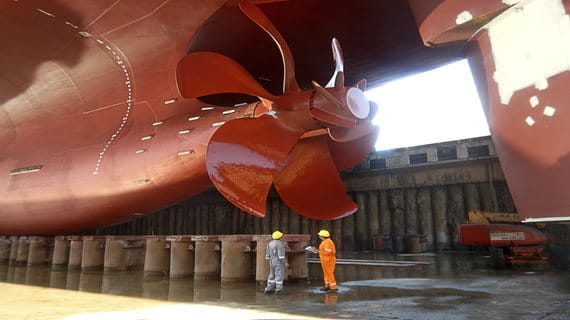
/en/newsroom/stories/how-msc-ensures-its-fleet-is-environmentally-friendly

The situation
MSC operates one of the youngest fleets in the world. It represents a massive financial investment in modern, efficient and environmentally-friendly vessels.
As our fleet grows and technology develops, we continuously engage with shipbuilders, design firms, classification societies and other stakeholders to ensure that our strategic investments are both environmentally and economically viable.
Our Strategy
Through investments in capacity management and economies of scale, we have managed to increase our average capacity per ship from 2,500 TEU in 2003 to 6,500 TEU in 2017, significantly higher than the average of the top 10 cargo carriers.
Confirmed in Q3 2017, our order of pioneering new ships underlines our leading role in driving global standards of ship design and energy efficiency. Delivery of the 11 x 23,000 TEU container ships is scheduled for 2019 and 2020. These mega-ships will be propelled by ultra-efficient G-type engines and will include the latest energy-saving technologies in line with the IMO’s Energy Efficiency Design Index (EEDI) standards. In addition, the ground-breaking size of the new ships will significantly reduce emissions per amount of cargo carried.
Over the last six years, we have been upgrading our fleet of owned and operated ships to the latest standards of safety and fuel efficiency. Since its launch in 2011, our retrofitting programme has considerably reduced carbon dioxide emissions. MSC has been investing in energy-saving technologies, including a specially designed bulbous bow, lighter and more efficient propellers, and new rudders designed to reduce drag. Hulls are treated with a silicon-based anti-fouling coating to minimize friction, the need for underwater cleaning and the risk of spread of invasive species. At the same time, our ship management centres are retrofitting our ships’ main propulsion engines to make them more efficient.
MSC is advancing its commitment for cleaner seas by ensuring it is operating a modern fleet with minimized air emissions, including greenhouse gases.
MSC fully supports uniform enforcement of the decision by the International Maritime Organization (IMO) relating to the 2020 global cap on fuel Sulphur content. This will reduce the Sulphur limit for marine fuel from the current 3.5% m/m to 0.5% m/m globally and to 0.1% m/m in designated Emission Control Areas (ECAs).
We have invested heavily in exploring various strategies to comply with the 2020 Sulphur Cap. MSC’s technical teams have been working for years to research, analyze, review and propose various available options.
Our Impact
Emissions vary from vessel to vessel and voyage to voyage, for reasons including operational factors, vessel load and waiting times in ports. To monitor the performance of individual ships and our fleet over time, among other measures, we use the Energy Efficiency Operational Indicator (EEOI) tool, as set out in the IMO Guideline MEPC.1/circ.684.
Our EEOI analyses show that we have significantly reduced our carbon dioxide emissions per metric tonne of cargo moved on a per mile basis. Between 2016 and 2017, we reduced our EEOI from 15.55 to 14.80, and between 2015 and 2017 from 16.58 to 14.80 indicating an efficiency improvement of 11%
To find out more, see pages 50-55 in the MSC 2018 Sustainability Report
Read more about MSC's environment pillar.